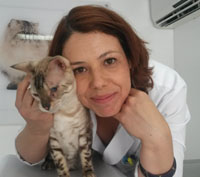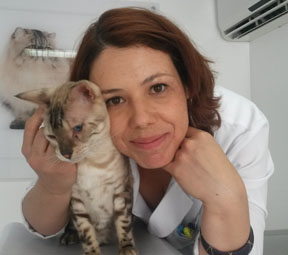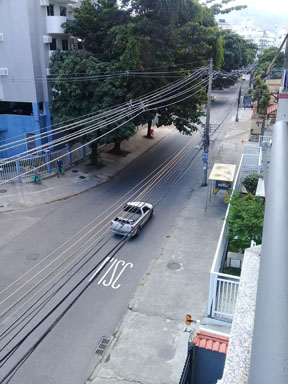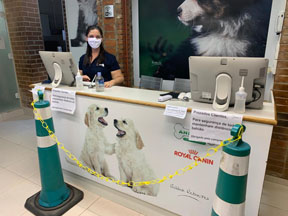
Dr. Raquel Calixto 288

Photo courtesy of Dr. Raquel Calixto
Dr. Raquel Calixto is shown with a patient in the days before the COVID-19 pandemic.
Dr. Raquel Calixto, 44, is a feline veterinarian at a general practice and specialty clinic with more than two dozen veterinarians in Rio de Janeiro, the second-largest city in Brazil. Originally from a city on Guanabara Bay called Duque de Caxias, about an hour's drive north, she moved to Rio in 2013. Calixto lives alone but her older brother and parents, who are both 80 years old, also live in Rio.
By email, Calixto answered questions about everyday life in Rio during the COVID-19 pandemic. Brazil has logged more than 63,000 cases and 4,500 deaths, according to a count kept by a Johns Hopkins University team.
Describe the neighborhoods where you live and work, before the pandemic.
I live in a building where my neighbors are so quiet, but my street is so busy and noisy. I work in an open mall on a very busy street. Our neighbors are small stores and restaurants. It is a quiet place, too.
The first case of COVID-19 in Brazil was confirmed on Feb. 25, about a month later than the first case that was identified in the U.S. and two months after the first cases were recognized in China. What has it been like to see the coronavirus create havoc around the world, and then show up in your country?
It is a terrifying situation. I feel like I live inside a sci-fi movie, but it's totally real.
What are the restrictions now in Rio de Janeiro?
Rio street 288

Photo by Dr. Raquel Calixto
The view from Dr. Raquel Calixto's home balcony shows a normally bustling city street quieted by government restrictions.
There are many restrictions. The government publishes several rules through decrees every week, sometimes every day. At the beginning, the restrictions were about the people circulating; and the stores, restaurants, cinemas, theaters, shows, all these places were closed. After that, there was a reduction of circulation of people between different states, and now between different cities. Now, the government of the state of Rio de Janeiro decreed the mandatory use of masks outside the home. Every citizen caught without a mask will be fined R$140 (about US$25).
How are you and your fellow citizens responding to measures to contain the virus?
I am fine. I am healthy, but I am diabetic, so I'm from the risk group. At the beginning, the streets were empty, most stores were closed. Now, I see so many people outside home, more stores are open. I feel like the quarantine is being sabotaged.
What are your biggest concerns about the coming days, weeks and months in Rio?
I'm concerned about public health. We don't have the infrastructure to deal with this pandemic. Despite the field hospitals, our situation is still delicate and terrifying. There are nine field hospitals in the state of Rio de Janeiro, three in Rio de Janeiro city and six in other cities. But I keep asking myself, is this enough?! We are far from the infection peak and people are already walking the streets.
Did Carnaval go on as planned in late February? Were there any limitations on the festivities?
The festival went as planned, no limitations, as it happens every year.
Is your practice still open? If yes, how do you and your colleagues protect yourselves?
Yes. Every person who works at the clinic wears a mask and keeps their hands washed constantly. There are several alcohol gel bottles scattered around. There are also barricades in front of the reception desk to keep distance (two meters). We reduced the number of veterinarians per shift and other employees, too. I reduced my schedule. I select only the urgent cases, and I leave my isolation once or twice a week to go to the clinic.
Are there restrictions on the purposes for which people may see the veterinarian for their pets? Are you modifying what your clinic offers?
We guide the client on the phone to come to the clinic alone. If not possible, we ask that the companion remain in the open parking. Visits to hospitalized patients are suspended. We still offer the same services, but we are focusing on urgent care and essential procedures determined by the Federal Council of Veterinary Medicine (CFMV); no elective procedures are being performed.
What is a day in your practice like now? How is it different from two months ago?
Rio clinic 288

Photo by Dr. Renato Costa
Hand sanitizer, stanchions to enforce social distancing and face masks are de rigueur at the Rio clinic where Dr. Raquel Calixto works.
Presently, I care for a very few patients, only the urgent cases. I feel as vulnerable at work as I feel in the market or pharmacy. I have the impression that nothing is enough to really protect you. Do you know what I mean?!
Have you seen changes in pet owners’ attitudes about why they dare seeking veterinary care?
Yes. Now, most pet owners seek veterinary care only in cases where really necessary.
How will you cope with the loss of income?
This situation is an enormous concern because if I don't work, I have no money. Simple like that. I try to keep my mind clear, but I don't know what will be in the next few months.
What effects, good or bad, has the crisis had on pets?
I think the major good effect for pets is the constant presence of their owner at home. The owner at home all the time means more pet moments, more attention, more interaction, more food or treats. The bad effect maybe is a consequence of more food and treats — obesity!
Are you taking lessons from veterinary colleagues and others in locations at earlier stages of the epidemic?
Yes. I keep myself updated every day both in the human pandemic scenario and the news related to animals.
What would you like people outside of Brazil to know about your home city or country during the pandemic?
I would like to inform them that we are in the same situation overall, despite the difference in daily incidence and mortality, depending on the country or state or city. We are all scared. We've never experienced a situation like this before. We know very little information about SARS-CoV-2 [the virus that causes COVID-19] and nobody knows when it will end. So we need to keep our minds on staying healthy, and we need to follow government recommendations.
How has the emergency affected your personal and family life?
My parents are my biggest concern precisely. Today, I am just a little emotional, some days are harder. All of this affects me in emotional and rational ways.
Do you know anyone who has or had COVID-19?
Yes. I have three great friends with mild symptoms. And a distant cousin died.
What do you do to safeguard your emotional health?
Actually, I am very peaceful. Sometimes this is strange to me, but I keep taking my floral remedies (Bach, Saint Germain, etc.).
Do you see any silver linings to this emergency situation?
Undoubtedly, the world has already changed, but my lack of faith in humanity (based on what I see around the world) doesn't allow me to believe, like many persons are saying, that the world will improve. I believe in the existence of kindness, of charity, of respect. I believe that among humanity, there are good people because I have examples of people like that in my life. But humanity is seriously ill, and I really do not believe there is a remedy for it.